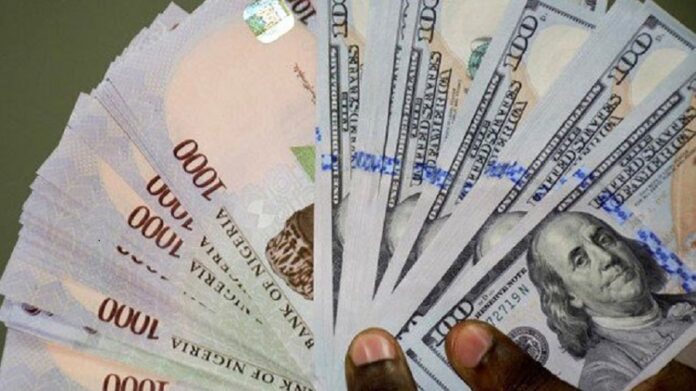By Milcah Tanimu
Nigeria’s naira continued its downward trend, marking its fifth consecutive day of losses. On Monday, the currency hit its weakest level since March, despite the Central Bank of Nigeria’s (CBN) intervention amid heightened seasonal demand for dollars.
At the official close on Monday, the naira stood at 1,577.29 per dollar, down from 1,563.8 on Friday, according to FMDQ. This decline occurred even after the CBN sold $122.7 million to local currency dealers on July 10-11. Analysts believe these dollar sales were insufficient to meet domestic demand for the greenback.
Samir Gadio, head of Africa strategy at Standard Chartered Plc in London, noted that while the naira might be undervalued, significant portfolio and capital inflows are necessary for stabilization and potential recovery.
Carlo Morelli, senior portfolio manager at Azimut Investment SA, highlighted that the CBN’s occasional $50 million sales were inadequate. He attributed the thin domestic market to capital outflows and lack of investor confidence, despite the central bank’s efforts to tighten monetary policy and manage naira liquidity.
The CBN has aggressively raised interest rates to combat high inflation and stabilize the naira, which has weakened by about 70% against the dollar since exchange-rate controls were relaxed last year. The central bank’s benchmark borrowing rate has increased by 14.75 percentage points since May 2022, reaching 26.25%. Another rate decision is expected on July 23, especially after data showed annual inflation quickening to 34.2% in June.
Despite recent pressures, Nigeria’s foreign exchange reserves have risen to $35 billion as of July 8, the highest since May 2023, thanks to loans from the World Bank and the African Export-Import Bank.
Omobola Adu at BancTrust & Co. Investment Bank mentioned that the recent naira pressure stems from corporates and individuals preparing for foreign vacations. Adu suggested that boosting FX supply, potentially through a eurobond or local dollar bond sale, as well as increased support from multilateral institutions, could alleviate this pressure.
CBN Governor Olayemi Cardoso expressed optimism, stating that the worst of the currency’s volatility is over. He reiterated this in Lagos, citing improved crude oil output and increased capital inflows as supportive factors.
Nigeria, Africa’s largest crude producer, relies heavily on oil sales, which constitute at least 80% of export earnings, to support the naira. The country’s output of crude oil and condensates rose to 1.5 million barrels per day in June, the highest since February, according to the nation’s upstream petroleum regulatory commission.
As the market anticipates the impact of ongoing CBN interventions, the stability of the naira remains a focal point for investors and policymakers alike.

